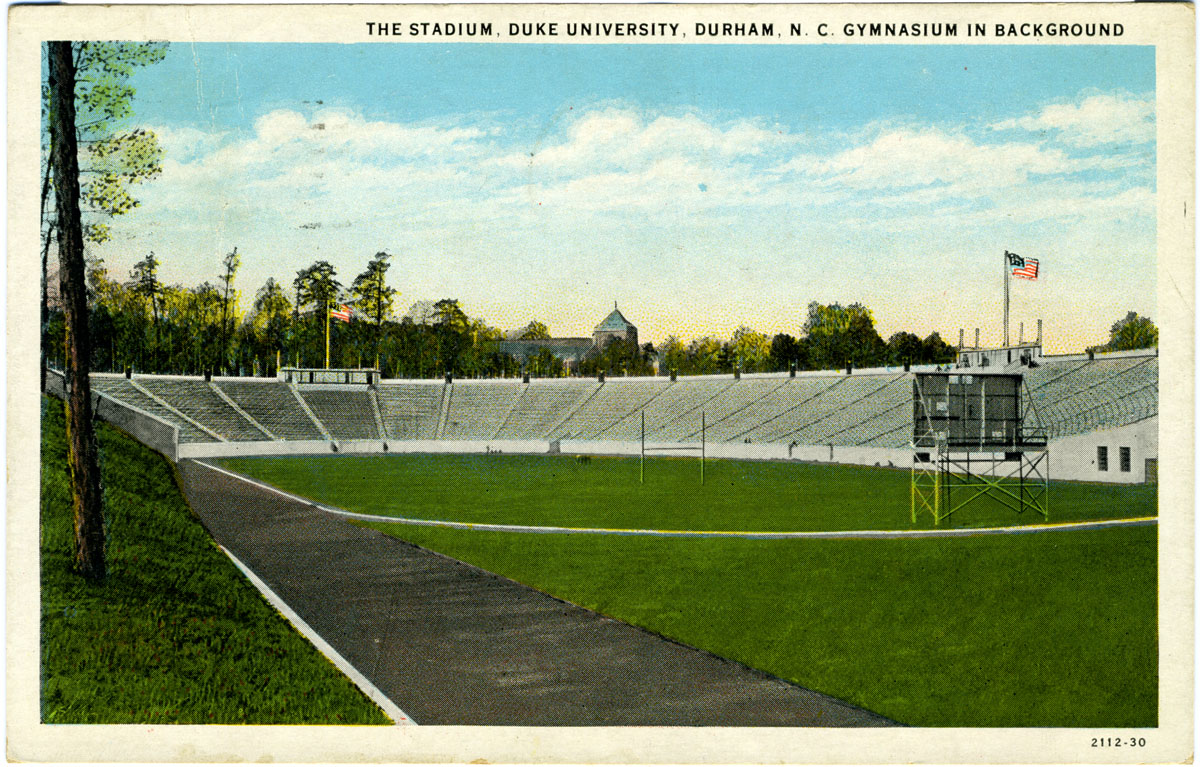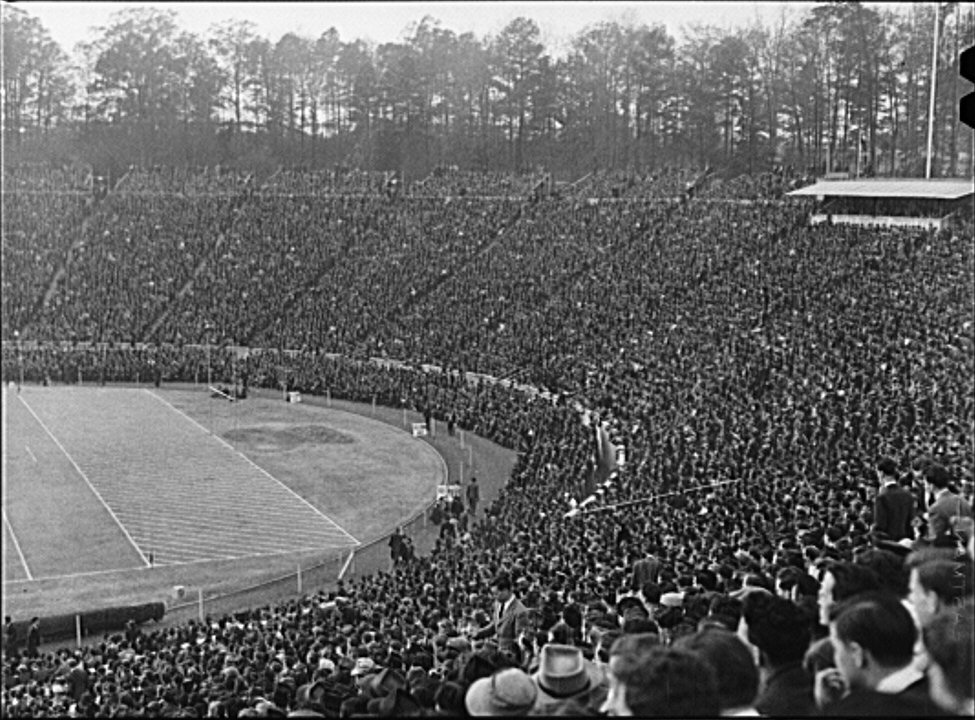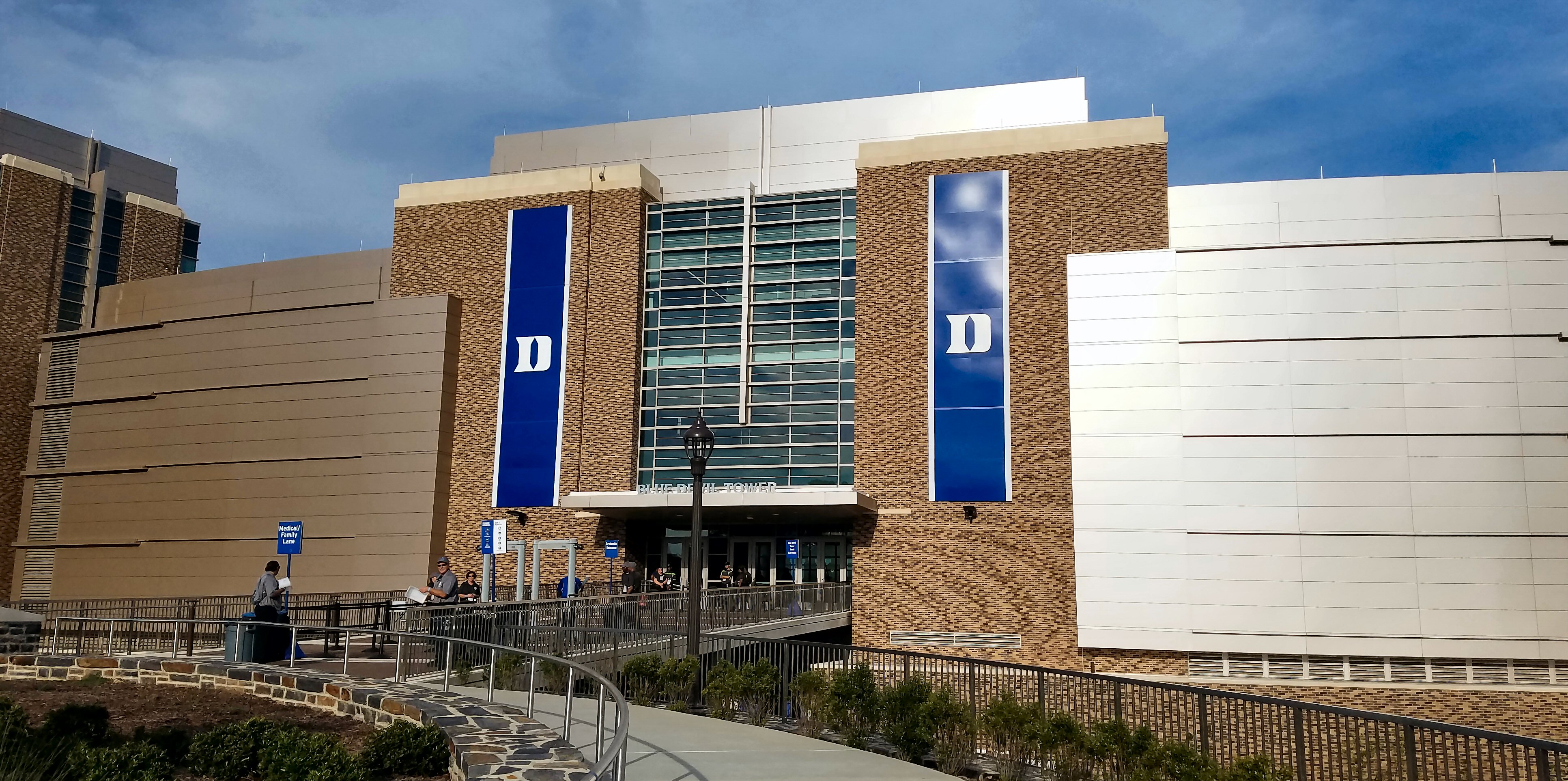Wallace Wade Stadium on:
[Wikipedia]
[Google]
[Amazon]
Wallace Wade Stadium, in full Brooks Field at Wallace Wade Stadium, is a 40,004-seat outdoor

 Wallace Wade Stadium opened in 1929 as "Duke Stadium", largely funded with bonds—the school advertised for "1,000 individuals to invest $100 in Duke's athletic future" and offered 6% interest.
The stadium is notable for being the site of the 1942 Rose Bowl on
Wallace Wade Stadium opened in 1929 as "Duke Stadium", largely funded with bonds—the school advertised for "1,000 individuals to invest $100 in Duke's athletic future" and offered 6% interest.
The stadium is notable for being the site of the 1942 Rose Bowl on

 In September 2014, renovation plans were released. The new stadium would seat nearly 40,000 and have 21 luxury suites housed within a new five-story, tower along the stadium's west side. A new high by wide LED video board would be installed closer to the field than the previous one. Another notable feature was the removal of the stadium's track, which allowed 4,000 additional seats to be added along with lowering and recentering the field. The concourses along the stadium's north and west sides were enhanced with new concessions and new gates, restroom facilities and first aid stations. Integrated seating in compliance with the Americans with Disabilities Act were also added for disabled guests and their companions. The first two phases of the renovations were finished over a two-year period, including the new press box, eight broadcast booths and suites completed by the 2016 college football season.
Phase three was completed prior to the 2017 season. It included completion of ADA boxes currently in one-third of the concourse on the north and east concourse, rebuilding the concourse surface, and construction of a north gate ticket booth and various concessions, bathroom, and future store buildings on the east concourse. The alumni box on the north concourse was also replaced with a new auxiliary scoreboard.
In September 2014, renovation plans were released. The new stadium would seat nearly 40,000 and have 21 luxury suites housed within a new five-story, tower along the stadium's west side. A new high by wide LED video board would be installed closer to the field than the previous one. Another notable feature was the removal of the stadium's track, which allowed 4,000 additional seats to be added along with lowering and recentering the field. The concourses along the stadium's north and west sides were enhanced with new concessions and new gates, restroom facilities and first aid stations. Integrated seating in compliance with the Americans with Disabilities Act were also added for disabled guests and their companions. The first two phases of the renovations were finished over a two-year period, including the new press box, eight broadcast booths and suites completed by the 2016 college football season.
Phase three was completed prior to the 2017 season. It included completion of ADA boxes currently in one-third of the concourse on the north and east concourse, rebuilding the concourse surface, and construction of a north gate ticket booth and various concessions, bathroom, and future store buildings on the east concourse. The alumni box on the north concourse was also replaced with a new auxiliary scoreboard.
Wallace Wade Stadium from the Duke University Archives
Satellite Photo of Wallace Wade Stadium
{{Triangle sports venues College football venues Duke Blue Devils football Sports venues in Durham, North Carolina Rose Bowl Game 1929 establishments in North Carolina Duke Blue Devils sports venues Sports venues completed in 1929 American football venues in North Carolina Defunct athletics (track and field) venues in the United States
stadium
A stadium ( : stadiums or stadia) is a place or venue for (mostly) outdoor sports, concerts, or other events and consists of a field or stage either partly or completely surrounded by a tiered structure designed to allow spectators to stand o ...
in the southeastern United States
The Southeastern United States, also referred to as the American Southeast or simply the Southeast, is a geographical region of the United States. It is located broadly on the eastern portion of the southern United States and the southern por ...
, located on the campus of Duke University
Duke University is a private research university in Durham, North Carolina. Founded by Methodists and Quakers in the present-day city of Trinity in 1838, the school moved to Durham in 1892. In 1924, tobacco and electric power industrialist James ...
in Durham, North Carolina
Durham ( ) is a city in the U.S. state of North Carolina and the county seat of Durham County, North Carolina, Durham County. Small portions of the city limits extend into Orange County, North Carolina, Orange County and Wake County, North Carol ...
. Primarily used for American football
American football (referred to simply as football in the United States and Canada), also known as gridiron, is a team sport played by two teams of eleven players on a rectangular field with goalposts at each end. The offense, the team with ...
, it is the home field of the Duke Blue Devils
The Duke Blue Devils are the intercollegiate athletic teams that represent Duke University, located in Durham, North Carolina. Duke's athletics department features 27 varsity teams that all compete at the National Collegiate Athletic Associatio ...
of the Atlantic Coast Conference
The Atlantic Coast Conference (ACC) is a collegiate athletic conference located in the eastern United States. Headquartered in Greensboro, North Carolina, the ACC's fifteen member universities compete in the National Collegiate Athletic Associa ...
.
Opened in 1929
This year marked the end of a period known in American history as the Roaring Twenties after the Wall Street Crash of 1929 ushered in a worldwide Great Depression. In the Americas, an agreement was brokered to end the Cristero War, a Catholic ...
, it was the first facility in Duke's new West Campus. Originally Duke Stadium, it was renamed in 1967 for former head coach Wallace Wade
William Wallace Wade (June 15, 1892 – October 7, 1986) was an American football player and coach of football, basketball, and baseball, and college athletics administrator. He served as the head football coach at the University of Alabama fro ...
. The playing surface was renamed Brooks Field at the beginning of the 2015
File:2015 Events Collage new.png, From top left, clockwise: Civil service in remembrance of November 2015 Paris attacks; Germanwings Flight 9525 was purposely crashed into the French Alps; the rubble of residences in Kathmandu following the Apri ...
season after the removal of the track and lowering of the field-level seats.
History

 Wallace Wade Stadium opened in 1929 as "Duke Stadium", largely funded with bonds—the school advertised for "1,000 individuals to invest $100 in Duke's athletic future" and offered 6% interest.
The stadium is notable for being the site of the 1942 Rose Bowl on
Wallace Wade Stadium opened in 1929 as "Duke Stadium", largely funded with bonds—the school advertised for "1,000 individuals to invest $100 in Duke's athletic future" and offered 6% interest.
The stadium is notable for being the site of the 1942 Rose Bowl on New Year's Day
New Year's Day is a festival observed in most of the world on 1 January, the first day of the year in the modern Gregorian calendar. 1 January is also New Year's Day on the Julian calendar, but this is not the same day as the Gregorian one. Wh ...
. Duke had won the invitation to the game as the eastern representative. However, the attack on Pearl Harbor
The attack on Pearl HarborAlso known as the Battle of Pearl Harbor was a surprise military strike by the Imperial Japanese Navy Air Service upon the United States against the naval base at Pearl Harbor in Honolulu, Territory of Hawaii, j ...
on December 7, just weeks after the end of the 1941
Events
Below, the events of World War II have the "WWII" prefix.
January
* January–August – 10,072 men, women and children with mental and physical disabilities are asphyxiated with carbon monoxide in a gas chamber, at Hadamar Eu ...
season, led to fears of a Japanese
Japanese may refer to:
* Something from or related to Japan, an island country in East Asia
* Japanese language, spoken mainly in Japan
* Japanese people, the ethnic group that identifies with Japan through ancestry or culture
** Japanese diaspor ...
attack on the West Coast West Coast or west coast may refer to:
Geography Australia
* Western Australia
*Regions of South Australia#Weather forecasting, West Coast of South Australia
* West Coast, Tasmania
**West Coast Range, mountain range in the region
Canada
* Britis ...
. General John L. DeWitt
John Lesesne DeWitt (January 9, 1880 – June 20, 1962) was a 4-star general officer in the United States Army, best known for leading the Japanese American internment, internment of Japanese-Americans during World War II.
After the attack on Pe ...
, commander of the Western Defense Command
Western Defense Command (WDC) was established on 17 March 1941 as the command formation of the United States Army responsible for coordinating the defense of the Pacific Coast region of the United States during World War II. A second major respo ...
, advised the Tournament of Roses Association not to hold the game at the Rose Bowl in southern California
Southern California (commonly shortened to SoCal) is a geographic and Cultural area, cultural region that generally comprises the southern portion of the U.S. state of California. It includes the Los Angeles metropolitan area, the second most po ...
, since he was not willing to take a chance on the Japanese choosing to stage a bombing raid on a stadium with over 90,000 people in attendance. Soon afterward, the government banned all large public gatherings on the West Coast, which ruled out Bell Field
Bell Field, originally known as College Field (1893–1909), was an outdoor athletic stadium in the northwest United States, on the campus of Oregon State College (now University) in Corvallis, Oregon. It was the home venue of Oregon State Beavers ...
in Corvallis, Oregon
Corvallis ( ) is a city and the county seat of Benton County in central western Oregon, United States. It is the principal city of the Corvallis, Oregon Metropolitan Statistical Area, which encompasses all of Benton County. As of the 2020 United ...
, the on-campus venue of Oregon State
Oregon State University (OSU) is a public land-grant, research university in Corvallis, Oregon. OSU offers more than 200 undergraduate-degree programs along with a variety of graduate and doctoral degrees. It has the 10th largest engineering col ...
, the host team from the Pacific Coast Conference
The Pacific Coast Conference (PCC) was a college athletic conference in the United States which existed from 1915 to 1959. Though the Pac-12 Conference claims the PCC's history as part of its own, with eight of the ten PCC members (including a ...
(PCC). The Tournament of Roses Association originally planned to cancel the game, but Duke officials invited the Rose Bowl and Oregon State to Durham to play the game, and the offer was accepted.
On a cold, rainy January 1, 1942, 56,000 fans, 22,000 of whom sat on bleachers borrowed from nearby NC State
North Carolina State University (NC State) is a public land-grant research university in Raleigh, North Carolina. Founded in 1887 and part of the University of North Carolina system, it is the largest university in the Carolinas. The university ...
and UNC, watched the heavily-favored Blue Devils fall to the strong defense of the Beavers, 20–16. Until 2021
File:2021 collage V2.png, From top left, clockwise: the James Webb Space Telescope was launched in 2021; Protesters in Yangon, Myanmar following the 2021 Myanmar coup d'état, coup d'état; A civil demonstration against the October–November 2021 ...
, it was the only Rose Bowl Game
The Rose Bowl Game is an annual American college football bowl game, usually played on January 1 (New Year's Day) at the Rose Bowl in Pasadena, California. When New Year's Day falls on a Sunday, the game is played on Monday, January 2. The Rose ...
played outside of Pasadena, California
Pasadena ( ) is a city in Los Angeles County, California, northeast of downtown Los Angeles. It is the most populous city and the primary cultural center of the San Gabriel Valley. Old Pasadena is the city's original commercial district.
I ...
.
In 1967, the venue was renamed for head coach Wallace Wade
William Wallace Wade (June 15, 1892 – October 7, 1986) was an American football player and coach of football, basketball, and baseball, and college athletics administrator. He served as the head football coach at the University of Alabama fro ...
.
In 1972, Wallace Wade Stadium hosted the first edition of the Pelican Bowl
The Pelican Bowl is a defunct, Louisiana-based NCAA Division II bowl game that was intended to match the overall champions or top-seeded co-champions from the then-new Mid-Eastern Athletic Conference (MEAC) and the long-established Southwestern A ...
, a short-lived attempt at a black college football national championship game between the winner of the MEAC and the winner of the SWAC. Grambling
Grambling State University (GSU, Grambling, or Grambling State) is a public historically black university in Grambling, Louisiana. Grambling State is home of the Eddie G. Robinson Museum and is listed on the Louisiana African American Heritag ...
defeated NC Central by a score of 56–6 in front of 22,500 fans.
In October 2012, Duke announced major renovations projected to eventually seat 43,915.
In 2015, Steve Brooks, Duke alumnus and CEO of the Phoenix American Insurance Group, donated $13 million to the Duke Athletics department. The playing surface was renamed Brooks Field in his honor.
Renovations

 In September 2014, renovation plans were released. The new stadium would seat nearly 40,000 and have 21 luxury suites housed within a new five-story, tower along the stadium's west side. A new high by wide LED video board would be installed closer to the field than the previous one. Another notable feature was the removal of the stadium's track, which allowed 4,000 additional seats to be added along with lowering and recentering the field. The concourses along the stadium's north and west sides were enhanced with new concessions and new gates, restroom facilities and first aid stations. Integrated seating in compliance with the Americans with Disabilities Act were also added for disabled guests and their companions. The first two phases of the renovations were finished over a two-year period, including the new press box, eight broadcast booths and suites completed by the 2016 college football season.
Phase three was completed prior to the 2017 season. It included completion of ADA boxes currently in one-third of the concourse on the north and east concourse, rebuilding the concourse surface, and construction of a north gate ticket booth and various concessions, bathroom, and future store buildings on the east concourse. The alumni box on the north concourse was also replaced with a new auxiliary scoreboard.
In September 2014, renovation plans were released. The new stadium would seat nearly 40,000 and have 21 luxury suites housed within a new five-story, tower along the stadium's west side. A new high by wide LED video board would be installed closer to the field than the previous one. Another notable feature was the removal of the stadium's track, which allowed 4,000 additional seats to be added along with lowering and recentering the field. The concourses along the stadium's north and west sides were enhanced with new concessions and new gates, restroom facilities and first aid stations. Integrated seating in compliance with the Americans with Disabilities Act were also added for disabled guests and their companions. The first two phases of the renovations were finished over a two-year period, including the new press box, eight broadcast booths and suites completed by the 2016 college football season.
Phase three was completed prior to the 2017 season. It included completion of ADA boxes currently in one-third of the concourse on the north and east concourse, rebuilding the concourse surface, and construction of a north gate ticket booth and various concessions, bathroom, and future store buildings on the east concourse. The alumni box on the north concourse was also replaced with a new auxiliary scoreboard.
Concerts
See also
*List of NCAA Division I FBS football stadiums
This is a list of stadiums that currently serve as the home venue for Football Bowl Subdivision college football teams. These include most of the largest stadiums in the United States.
Conference affiliations reflect those in the current 2022 ...
References
External links
*Wallace Wade Stadium from the Duke University Archives
Satellite Photo of Wallace Wade Stadium
{{Triangle sports venues College football venues Duke Blue Devils football Sports venues in Durham, North Carolina Rose Bowl Game 1929 establishments in North Carolina Duke Blue Devils sports venues Sports venues completed in 1929 American football venues in North Carolina Defunct athletics (track and field) venues in the United States